HI6027 Business & Corporate Law: Analysis of Swimmingpool Co. Case
VerifiedAdded on 2023/03/30
|9
|2138
|118
Case Study
AI Summary
This assignment presents a comprehensive legal analysis of two case studies. The first case examines the agency relationship between Swimmingpool Co. Ltd and its sales manager, Martin, focusing on issues of liability for Martin's actions, breach of duty, and competition. The analysis applies relevant agency law principles and case precedents to determine the company's and Martin's responsibilities. The second case explores a partnership business, LuSeKo, formed by three students. It discusses issues related to partnership duties, liabilities, dissolution, and property rights, referencing the Partnership Act 1963 and relevant case law. The analysis covers aspects like partner obligations, the impact of a partner's death, and the distribution of partnership assets to cover losses.
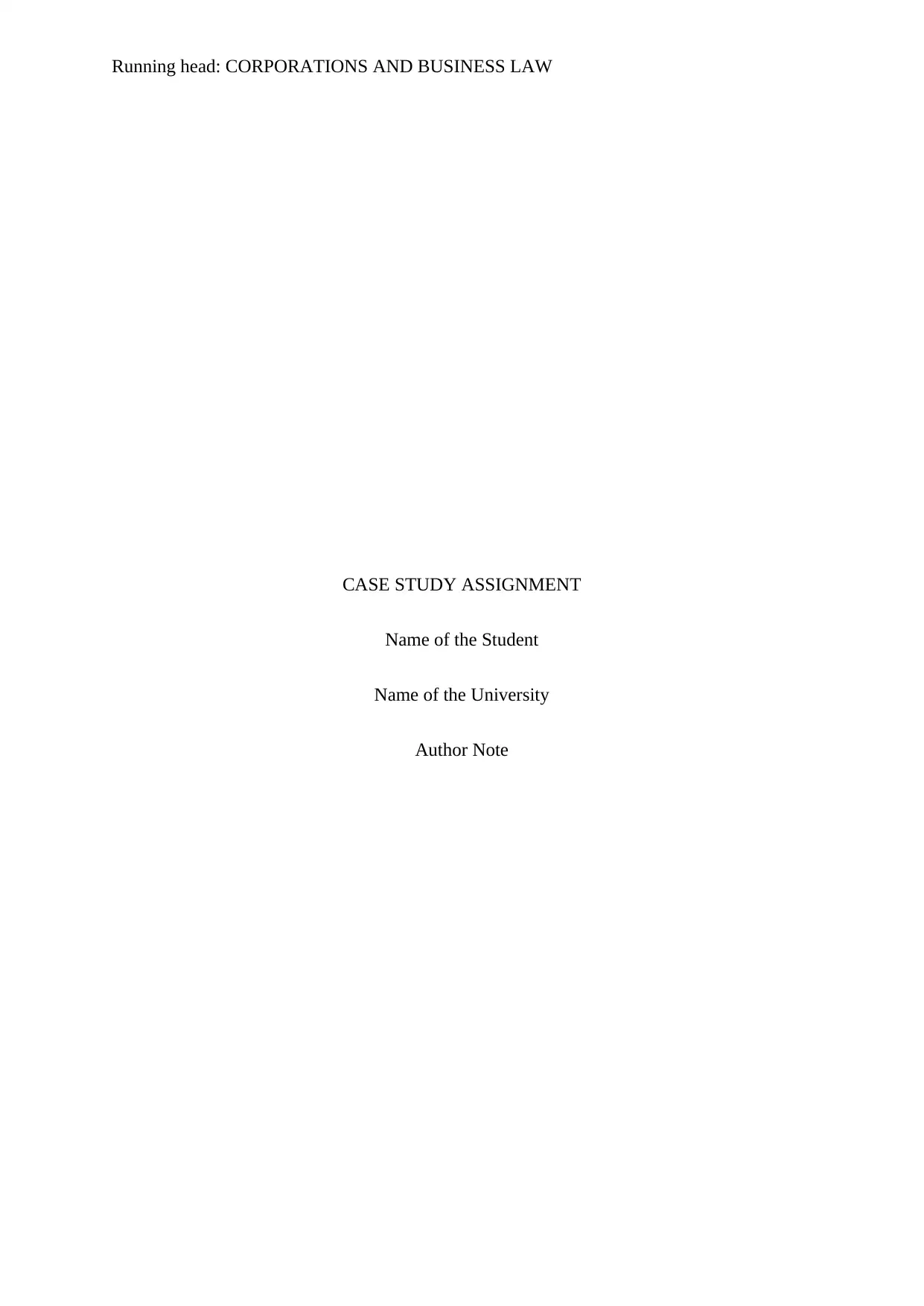
Running head: CORPORATIONS AND BUSINESS LAW
CASE STUDY ASSIGNMENT
Name of the Student
Name of the University
Author Note
CASE STUDY ASSIGNMENT
Name of the Student
Name of the University
Author Note
Paraphrase This Document
Need a fresh take? Get an instant paraphrase of this document with our AI Paraphraser
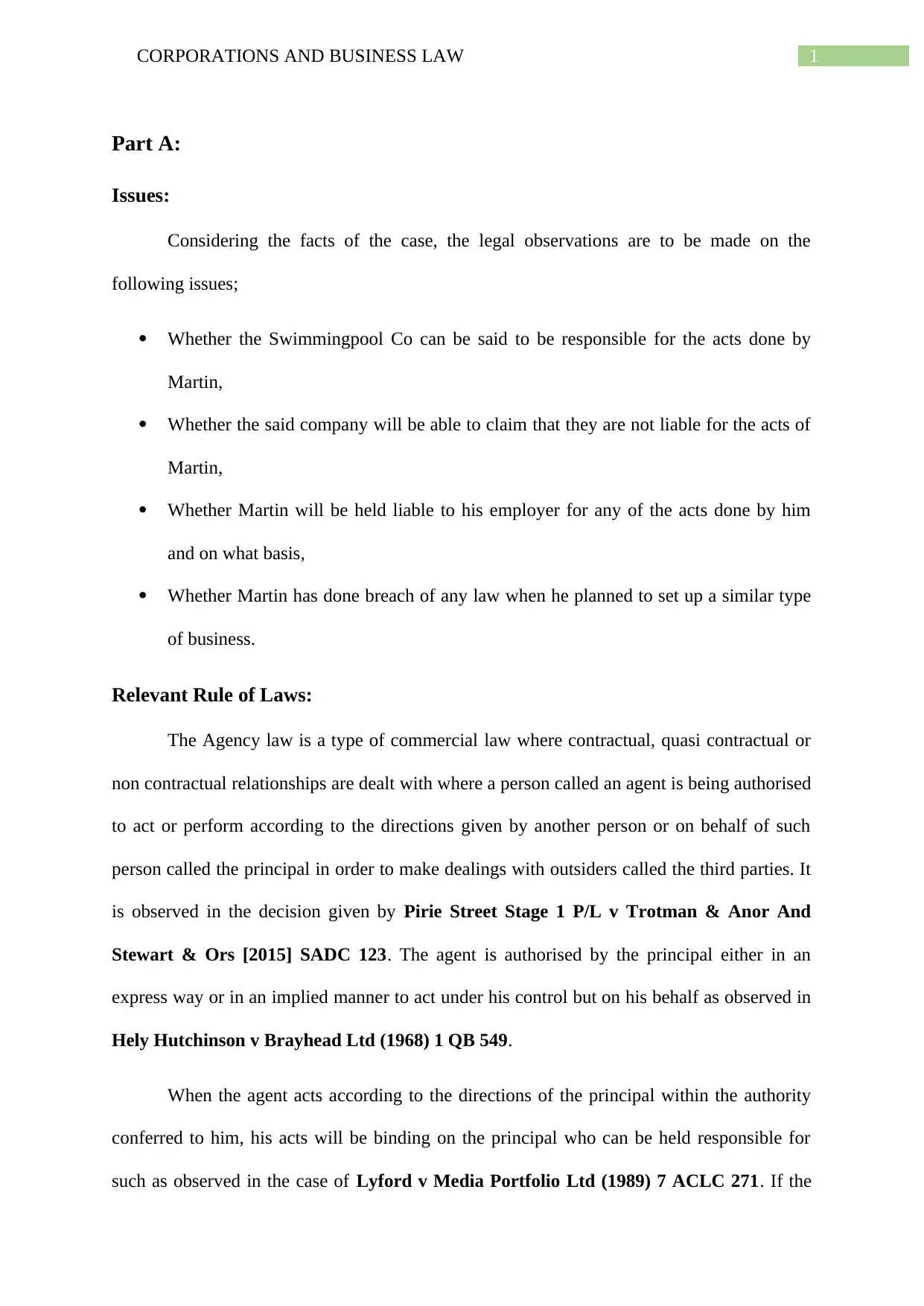
1CORPORATIONS AND BUSINESS LAW
Part A:
Issues:
Considering the facts of the case, the legal observations are to be made on the
following issues;
Whether the Swimmingpool Co can be said to be responsible for the acts done by
Martin,
Whether the said company will be able to claim that they are not liable for the acts of
Martin,
Whether Martin will be held liable to his employer for any of the acts done by him
and on what basis,
Whether Martin has done breach of any law when he planned to set up a similar type
of business.
Relevant Rule of Laws:
The Agency law is a type of commercial law where contractual, quasi contractual or
non contractual relationships are dealt with where a person called an agent is being authorised
to act or perform according to the directions given by another person or on behalf of such
person called the principal in order to make dealings with outsiders called the third parties. It
is observed in the decision given by Pirie Street Stage 1 P/L v Trotman & Anor And
Stewart & Ors [2015] SADC 123. The agent is authorised by the principal either in an
express way or in an implied manner to act under his control but on his behalf as observed in
Hely Hutchinson v Brayhead Ltd (1968) 1 QB 549.
When the agent acts according to the directions of the principal within the authority
conferred to him, his acts will be binding on the principal who can be held responsible for
such as observed in the case of Lyford v Media Portfolio Ltd (1989) 7 ACLC 271. If the
Part A:
Issues:
Considering the facts of the case, the legal observations are to be made on the
following issues;
Whether the Swimmingpool Co can be said to be responsible for the acts done by
Martin,
Whether the said company will be able to claim that they are not liable for the acts of
Martin,
Whether Martin will be held liable to his employer for any of the acts done by him
and on what basis,
Whether Martin has done breach of any law when he planned to set up a similar type
of business.
Relevant Rule of Laws:
The Agency law is a type of commercial law where contractual, quasi contractual or
non contractual relationships are dealt with where a person called an agent is being authorised
to act or perform according to the directions given by another person or on behalf of such
person called the principal in order to make dealings with outsiders called the third parties. It
is observed in the decision given by Pirie Street Stage 1 P/L v Trotman & Anor And
Stewart & Ors [2015] SADC 123. The agent is authorised by the principal either in an
express way or in an implied manner to act under his control but on his behalf as observed in
Hely Hutchinson v Brayhead Ltd (1968) 1 QB 549.
When the agent acts according to the directions of the principal within the authority
conferred to him, his acts will be binding on the principal who can be held responsible for
such as observed in the case of Lyford v Media Portfolio Ltd (1989) 7 ACLC 271. If the
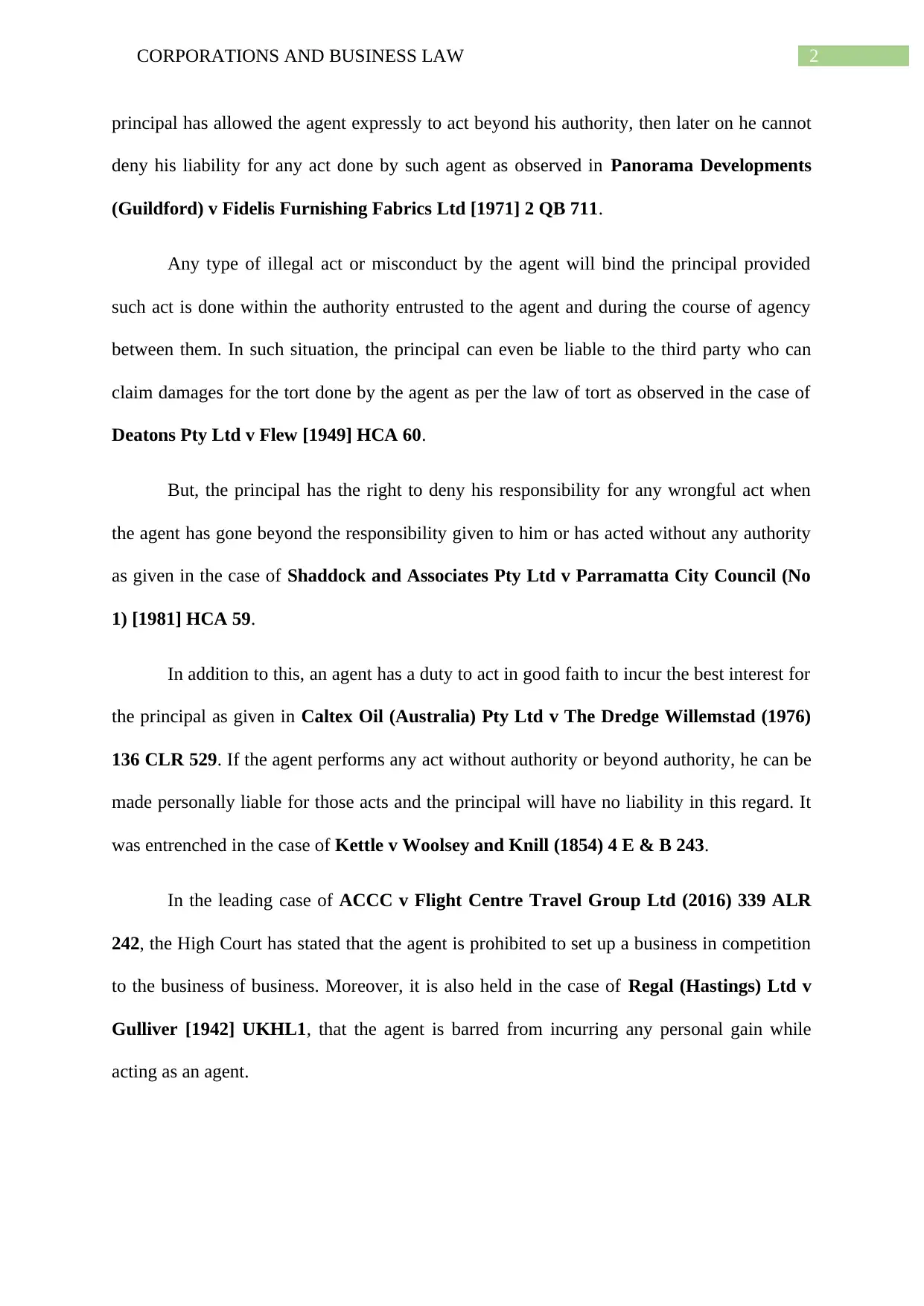
2CORPORATIONS AND BUSINESS LAW
principal has allowed the agent expressly to act beyond his authority, then later on he cannot
deny his liability for any act done by such agent as observed in Panorama Developments
(Guildford) v Fidelis Furnishing Fabrics Ltd [1971] 2 QB 711.
Any type of illegal act or misconduct by the agent will bind the principal provided
such act is done within the authority entrusted to the agent and during the course of agency
between them. In such situation, the principal can even be liable to the third party who can
claim damages for the tort done by the agent as per the law of tort as observed in the case of
Deatons Pty Ltd v Flew [1949] HCA 60.
But, the principal has the right to deny his responsibility for any wrongful act when
the agent has gone beyond the responsibility given to him or has acted without any authority
as given in the case of Shaddock and Associates Pty Ltd v Parramatta City Council (No
1) [1981] HCA 59.
In addition to this, an agent has a duty to act in good faith to incur the best interest for
the principal as given in Caltex Oil (Australia) Pty Ltd v The Dredge Willemstad (1976)
136 CLR 529. If the agent performs any act without authority or beyond authority, he can be
made personally liable for those acts and the principal will have no liability in this regard. It
was entrenched in the case of Kettle v Woolsey and Knill (1854) 4 E & B 243.
In the leading case of ACCC v Flight Centre Travel Group Ltd (2016) 339 ALR
242, the High Court has stated that the agent is prohibited to set up a business in competition
to the business of business. Moreover, it is also held in the case of Regal (Hastings) Ltd v
Gulliver [1942] UKHL1, that the agent is barred from incurring any personal gain while
acting as an agent.
principal has allowed the agent expressly to act beyond his authority, then later on he cannot
deny his liability for any act done by such agent as observed in Panorama Developments
(Guildford) v Fidelis Furnishing Fabrics Ltd [1971] 2 QB 711.
Any type of illegal act or misconduct by the agent will bind the principal provided
such act is done within the authority entrusted to the agent and during the course of agency
between them. In such situation, the principal can even be liable to the third party who can
claim damages for the tort done by the agent as per the law of tort as observed in the case of
Deatons Pty Ltd v Flew [1949] HCA 60.
But, the principal has the right to deny his responsibility for any wrongful act when
the agent has gone beyond the responsibility given to him or has acted without any authority
as given in the case of Shaddock and Associates Pty Ltd v Parramatta City Council (No
1) [1981] HCA 59.
In addition to this, an agent has a duty to act in good faith to incur the best interest for
the principal as given in Caltex Oil (Australia) Pty Ltd v The Dredge Willemstad (1976)
136 CLR 529. If the agent performs any act without authority or beyond authority, he can be
made personally liable for those acts and the principal will have no liability in this regard. It
was entrenched in the case of Kettle v Woolsey and Knill (1854) 4 E & B 243.
In the leading case of ACCC v Flight Centre Travel Group Ltd (2016) 339 ALR
242, the High Court has stated that the agent is prohibited to set up a business in competition
to the business of business. Moreover, it is also held in the case of Regal (Hastings) Ltd v
Gulliver [1942] UKHL1, that the agent is barred from incurring any personal gain while
acting as an agent.
⊘ This is a preview!⊘
Do you want full access?
Subscribe today to unlock all pages.

Trusted by 1+ million students worldwide
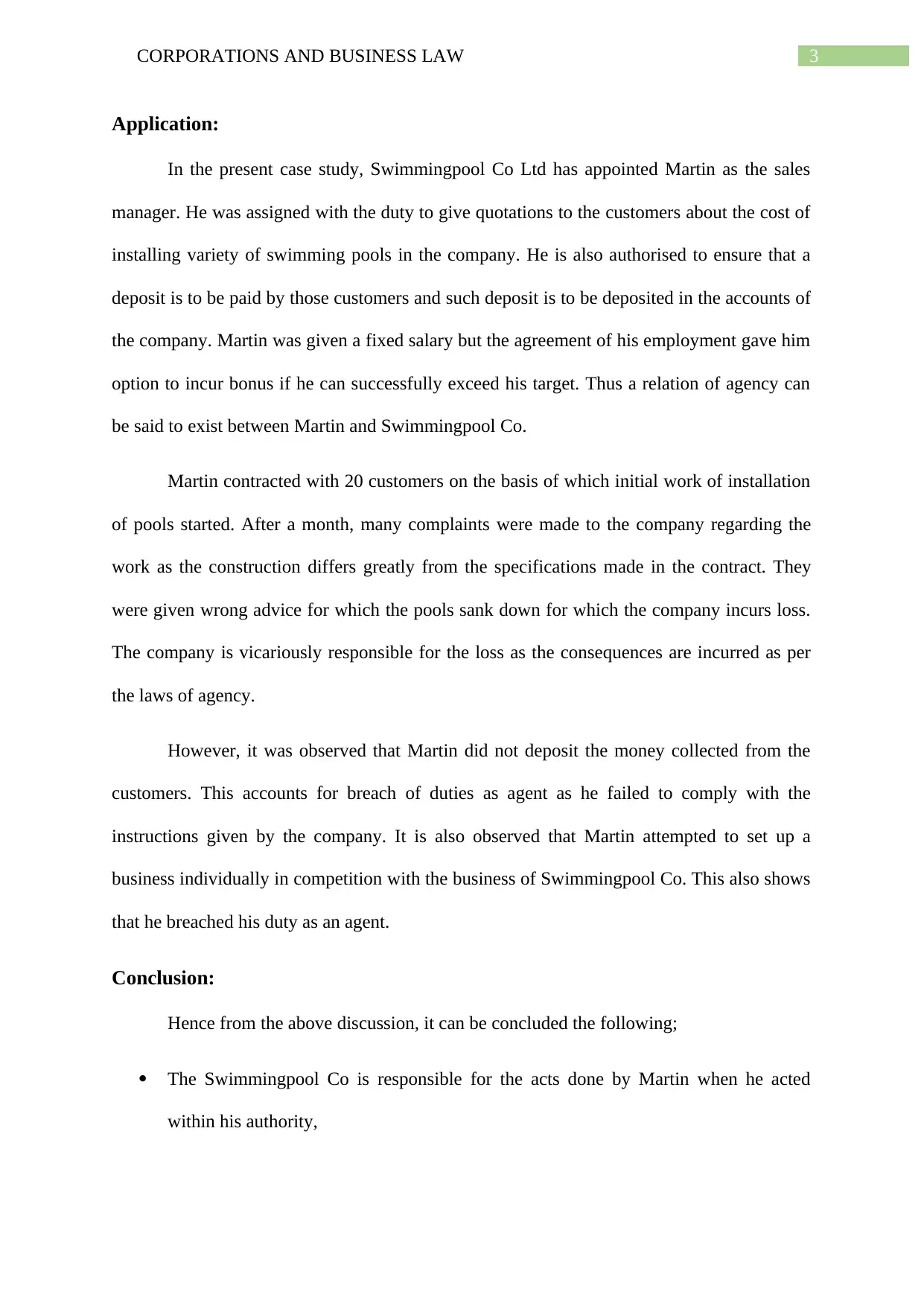
3CORPORATIONS AND BUSINESS LAW
Application:
In the present case study, Swimmingpool Co Ltd has appointed Martin as the sales
manager. He was assigned with the duty to give quotations to the customers about the cost of
installing variety of swimming pools in the company. He is also authorised to ensure that a
deposit is to be paid by those customers and such deposit is to be deposited in the accounts of
the company. Martin was given a fixed salary but the agreement of his employment gave him
option to incur bonus if he can successfully exceed his target. Thus a relation of agency can
be said to exist between Martin and Swimmingpool Co.
Martin contracted with 20 customers on the basis of which initial work of installation
of pools started. After a month, many complaints were made to the company regarding the
work as the construction differs greatly from the specifications made in the contract. They
were given wrong advice for which the pools sank down for which the company incurs loss.
The company is vicariously responsible for the loss as the consequences are incurred as per
the laws of agency.
However, it was observed that Martin did not deposit the money collected from the
customers. This accounts for breach of duties as agent as he failed to comply with the
instructions given by the company. It is also observed that Martin attempted to set up a
business individually in competition with the business of Swimmingpool Co. This also shows
that he breached his duty as an agent.
Conclusion:
Hence from the above discussion, it can be concluded the following;
The Swimmingpool Co is responsible for the acts done by Martin when he acted
within his authority,
Application:
In the present case study, Swimmingpool Co Ltd has appointed Martin as the sales
manager. He was assigned with the duty to give quotations to the customers about the cost of
installing variety of swimming pools in the company. He is also authorised to ensure that a
deposit is to be paid by those customers and such deposit is to be deposited in the accounts of
the company. Martin was given a fixed salary but the agreement of his employment gave him
option to incur bonus if he can successfully exceed his target. Thus a relation of agency can
be said to exist between Martin and Swimmingpool Co.
Martin contracted with 20 customers on the basis of which initial work of installation
of pools started. After a month, many complaints were made to the company regarding the
work as the construction differs greatly from the specifications made in the contract. They
were given wrong advice for which the pools sank down for which the company incurs loss.
The company is vicariously responsible for the loss as the consequences are incurred as per
the laws of agency.
However, it was observed that Martin did not deposit the money collected from the
customers. This accounts for breach of duties as agent as he failed to comply with the
instructions given by the company. It is also observed that Martin attempted to set up a
business individually in competition with the business of Swimmingpool Co. This also shows
that he breached his duty as an agent.
Conclusion:
Hence from the above discussion, it can be concluded the following;
The Swimmingpool Co is responsible for the acts done by Martin when he acted
within his authority,
Paraphrase This Document
Need a fresh take? Get an instant paraphrase of this document with our AI Paraphraser
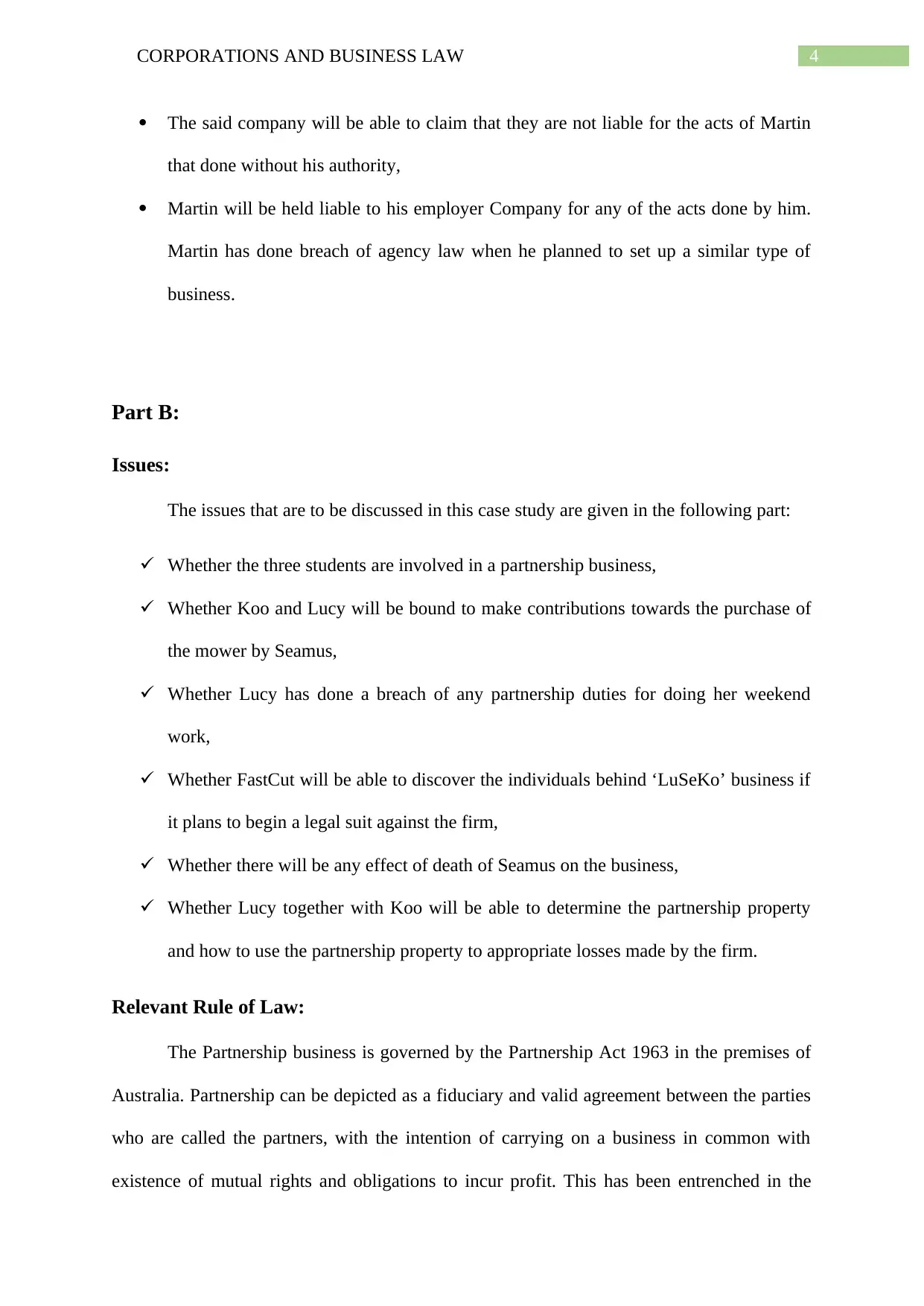
4CORPORATIONS AND BUSINESS LAW
The said company will be able to claim that they are not liable for the acts of Martin
that done without his authority,
Martin will be held liable to his employer Company for any of the acts done by him.
Martin has done breach of agency law when he planned to set up a similar type of
business.
Part B:
Issues:
The issues that are to be discussed in this case study are given in the following part:
Whether the three students are involved in a partnership business,
Whether Koo and Lucy will be bound to make contributions towards the purchase of
the mower by Seamus,
Whether Lucy has done a breach of any partnership duties for doing her weekend
work,
Whether FastCut will be able to discover the individuals behind ‘LuSeKo’ business if
it plans to begin a legal suit against the firm,
Whether there will be any effect of death of Seamus on the business,
Whether Lucy together with Koo will be able to determine the partnership property
and how to use the partnership property to appropriate losses made by the firm.
Relevant Rule of Law:
The Partnership business is governed by the Partnership Act 1963 in the premises of
Australia. Partnership can be depicted as a fiduciary and valid agreement between the parties
who are called the partners, with the intention of carrying on a business in common with
existence of mutual rights and obligations to incur profit. This has been entrenched in the
The said company will be able to claim that they are not liable for the acts of Martin
that done without his authority,
Martin will be held liable to his employer Company for any of the acts done by him.
Martin has done breach of agency law when he planned to set up a similar type of
business.
Part B:
Issues:
The issues that are to be discussed in this case study are given in the following part:
Whether the three students are involved in a partnership business,
Whether Koo and Lucy will be bound to make contributions towards the purchase of
the mower by Seamus,
Whether Lucy has done a breach of any partnership duties for doing her weekend
work,
Whether FastCut will be able to discover the individuals behind ‘LuSeKo’ business if
it plans to begin a legal suit against the firm,
Whether there will be any effect of death of Seamus on the business,
Whether Lucy together with Koo will be able to determine the partnership property
and how to use the partnership property to appropriate losses made by the firm.
Relevant Rule of Law:
The Partnership business is governed by the Partnership Act 1963 in the premises of
Australia. Partnership can be depicted as a fiduciary and valid agreement between the parties
who are called the partners, with the intention of carrying on a business in common with
existence of mutual rights and obligations to incur profit. This has been entrenched in the
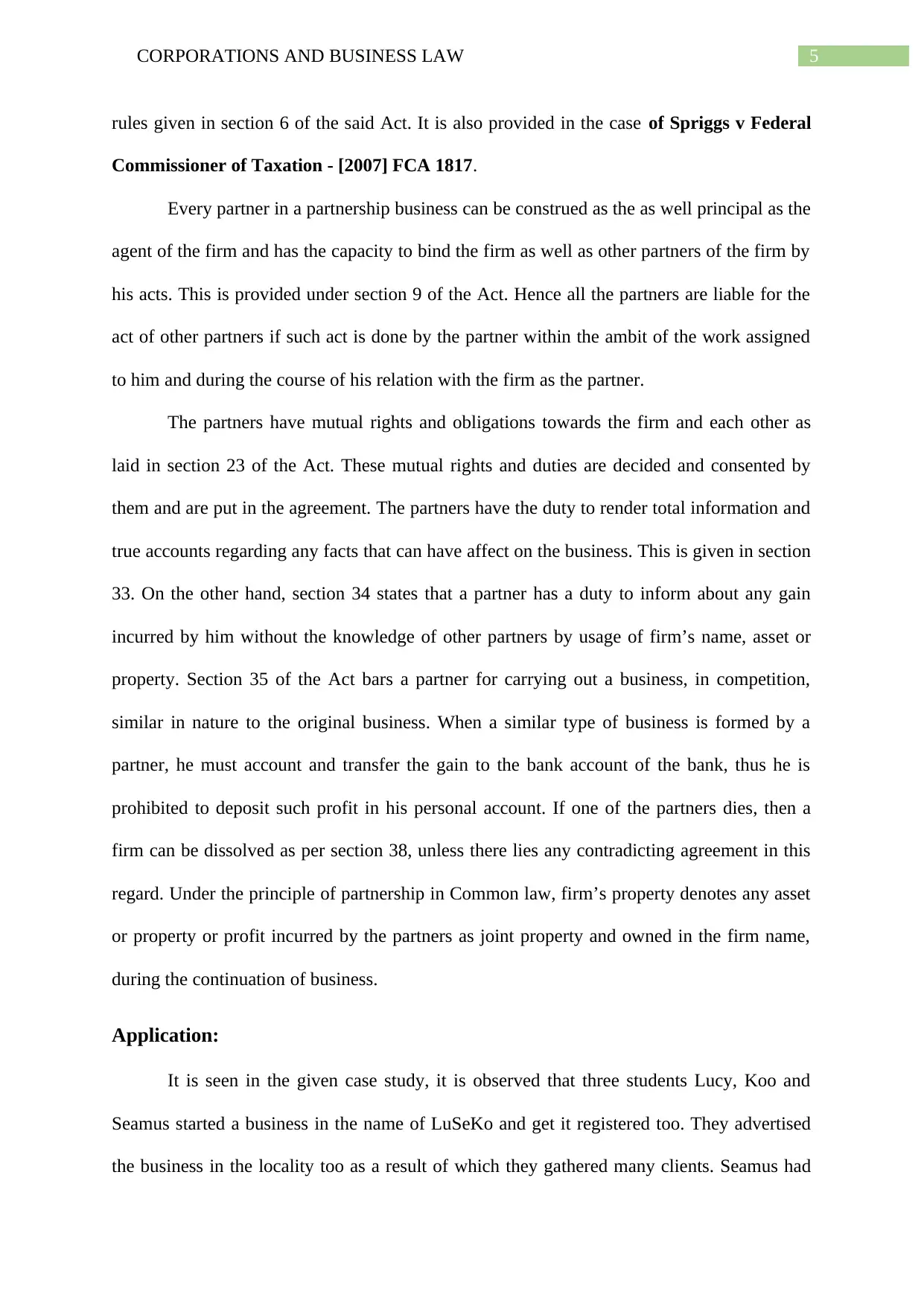
5CORPORATIONS AND BUSINESS LAW
rules given in section 6 of the said Act. It is also provided in the case of Spriggs v Federal
Commissioner of Taxation - [2007] FCA 1817.
Every partner in a partnership business can be construed as the as well principal as the
agent of the firm and has the capacity to bind the firm as well as other partners of the firm by
his acts. This is provided under section 9 of the Act. Hence all the partners are liable for the
act of other partners if such act is done by the partner within the ambit of the work assigned
to him and during the course of his relation with the firm as the partner.
The partners have mutual rights and obligations towards the firm and each other as
laid in section 23 of the Act. These mutual rights and duties are decided and consented by
them and are put in the agreement. The partners have the duty to render total information and
true accounts regarding any facts that can have affect on the business. This is given in section
33. On the other hand, section 34 states that a partner has a duty to inform about any gain
incurred by him without the knowledge of other partners by usage of firm’s name, asset or
property. Section 35 of the Act bars a partner for carrying out a business, in competition,
similar in nature to the original business. When a similar type of business is formed by a
partner, he must account and transfer the gain to the bank account of the bank, thus he is
prohibited to deposit such profit in his personal account. If one of the partners dies, then a
firm can be dissolved as per section 38, unless there lies any contradicting agreement in this
regard. Under the principle of partnership in Common law, firm’s property denotes any asset
or property or profit incurred by the partners as joint property and owned in the firm name,
during the continuation of business.
Application:
It is seen in the given case study, it is observed that three students Lucy, Koo and
Seamus started a business in the name of LuSeKo and get it registered too. They advertised
the business in the locality too as a result of which they gathered many clients. Seamus had
rules given in section 6 of the said Act. It is also provided in the case of Spriggs v Federal
Commissioner of Taxation - [2007] FCA 1817.
Every partner in a partnership business can be construed as the as well principal as the
agent of the firm and has the capacity to bind the firm as well as other partners of the firm by
his acts. This is provided under section 9 of the Act. Hence all the partners are liable for the
act of other partners if such act is done by the partner within the ambit of the work assigned
to him and during the course of his relation with the firm as the partner.
The partners have mutual rights and obligations towards the firm and each other as
laid in section 23 of the Act. These mutual rights and duties are decided and consented by
them and are put in the agreement. The partners have the duty to render total information and
true accounts regarding any facts that can have affect on the business. This is given in section
33. On the other hand, section 34 states that a partner has a duty to inform about any gain
incurred by him without the knowledge of other partners by usage of firm’s name, asset or
property. Section 35 of the Act bars a partner for carrying out a business, in competition,
similar in nature to the original business. When a similar type of business is formed by a
partner, he must account and transfer the gain to the bank account of the bank, thus he is
prohibited to deposit such profit in his personal account. If one of the partners dies, then a
firm can be dissolved as per section 38, unless there lies any contradicting agreement in this
regard. Under the principle of partnership in Common law, firm’s property denotes any asset
or property or profit incurred by the partners as joint property and owned in the firm name,
during the continuation of business.
Application:
It is seen in the given case study, it is observed that three students Lucy, Koo and
Seamus started a business in the name of LuSeKo and get it registered too. They advertised
the business in the locality too as a result of which they gathered many clients. Seamus had
⊘ This is a preview!⊘
Do you want full access?
Subscribe today to unlock all pages.

Trusted by 1+ million students worldwide
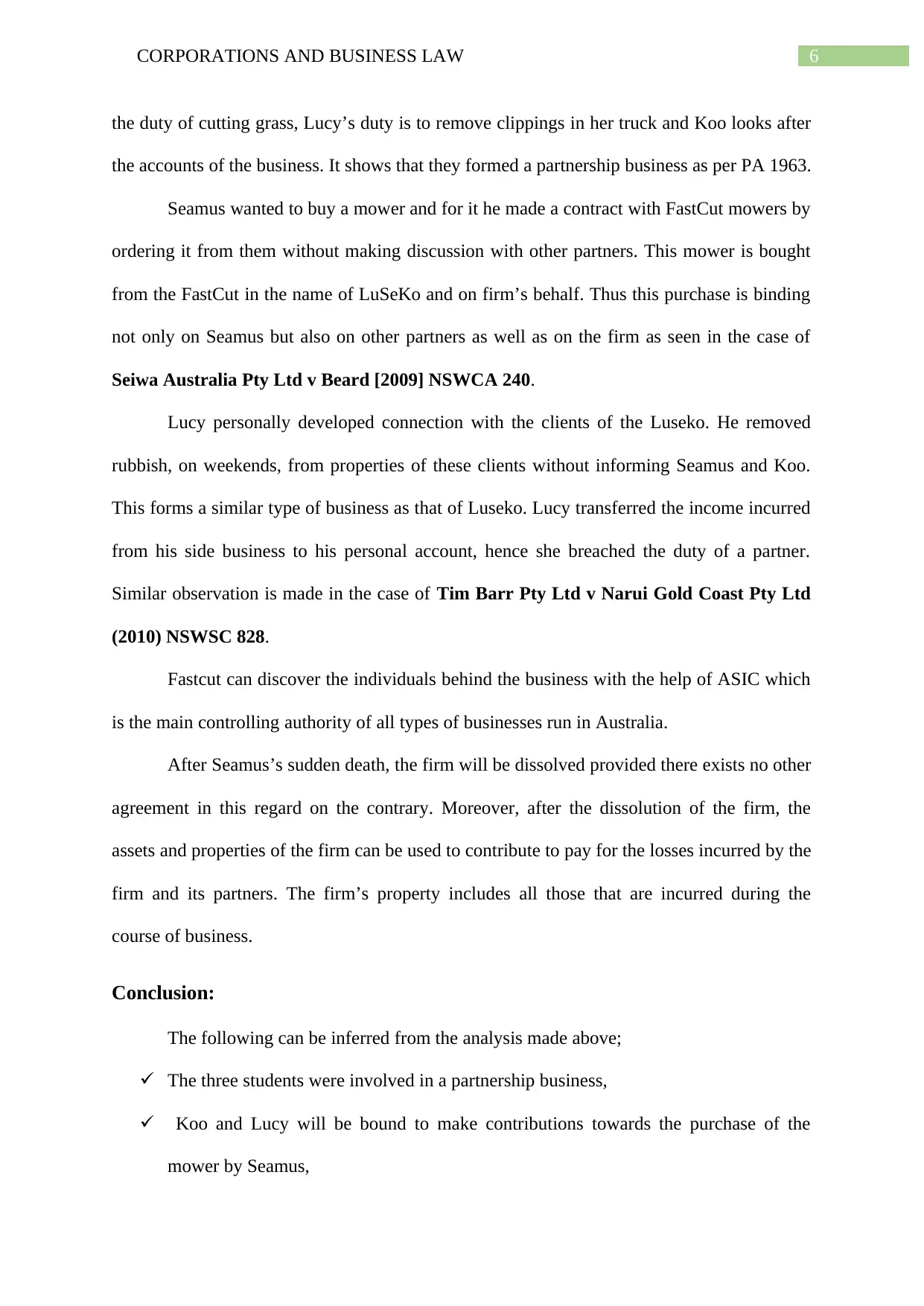
6CORPORATIONS AND BUSINESS LAW
the duty of cutting grass, Lucy’s duty is to remove clippings in her truck and Koo looks after
the accounts of the business. It shows that they formed a partnership business as per PA 1963.
Seamus wanted to buy a mower and for it he made a contract with FastCut mowers by
ordering it from them without making discussion with other partners. This mower is bought
from the FastCut in the name of LuSeKo and on firm’s behalf. Thus this purchase is binding
not only on Seamus but also on other partners as well as on the firm as seen in the case of
Seiwa Australia Pty Ltd v Beard [2009] NSWCA 240.
Lucy personally developed connection with the clients of the Luseko. He removed
rubbish, on weekends, from properties of these clients without informing Seamus and Koo.
This forms a similar type of business as that of Luseko. Lucy transferred the income incurred
from his side business to his personal account, hence she breached the duty of a partner.
Similar observation is made in the case of Tim Barr Pty Ltd v Narui Gold Coast Pty Ltd
(2010) NSWSC 828.
Fastcut can discover the individuals behind the business with the help of ASIC which
is the main controlling authority of all types of businesses run in Australia.
After Seamus’s sudden death, the firm will be dissolved provided there exists no other
agreement in this regard on the contrary. Moreover, after the dissolution of the firm, the
assets and properties of the firm can be used to contribute to pay for the losses incurred by the
firm and its partners. The firm’s property includes all those that are incurred during the
course of business.
Conclusion:
The following can be inferred from the analysis made above;
The three students were involved in a partnership business,
Koo and Lucy will be bound to make contributions towards the purchase of the
mower by Seamus,
the duty of cutting grass, Lucy’s duty is to remove clippings in her truck and Koo looks after
the accounts of the business. It shows that they formed a partnership business as per PA 1963.
Seamus wanted to buy a mower and for it he made a contract with FastCut mowers by
ordering it from them without making discussion with other partners. This mower is bought
from the FastCut in the name of LuSeKo and on firm’s behalf. Thus this purchase is binding
not only on Seamus but also on other partners as well as on the firm as seen in the case of
Seiwa Australia Pty Ltd v Beard [2009] NSWCA 240.
Lucy personally developed connection with the clients of the Luseko. He removed
rubbish, on weekends, from properties of these clients without informing Seamus and Koo.
This forms a similar type of business as that of Luseko. Lucy transferred the income incurred
from his side business to his personal account, hence she breached the duty of a partner.
Similar observation is made in the case of Tim Barr Pty Ltd v Narui Gold Coast Pty Ltd
(2010) NSWSC 828.
Fastcut can discover the individuals behind the business with the help of ASIC which
is the main controlling authority of all types of businesses run in Australia.
After Seamus’s sudden death, the firm will be dissolved provided there exists no other
agreement in this regard on the contrary. Moreover, after the dissolution of the firm, the
assets and properties of the firm can be used to contribute to pay for the losses incurred by the
firm and its partners. The firm’s property includes all those that are incurred during the
course of business.
Conclusion:
The following can be inferred from the analysis made above;
The three students were involved in a partnership business,
Koo and Lucy will be bound to make contributions towards the purchase of the
mower by Seamus,
Paraphrase This Document
Need a fresh take? Get an instant paraphrase of this document with our AI Paraphraser
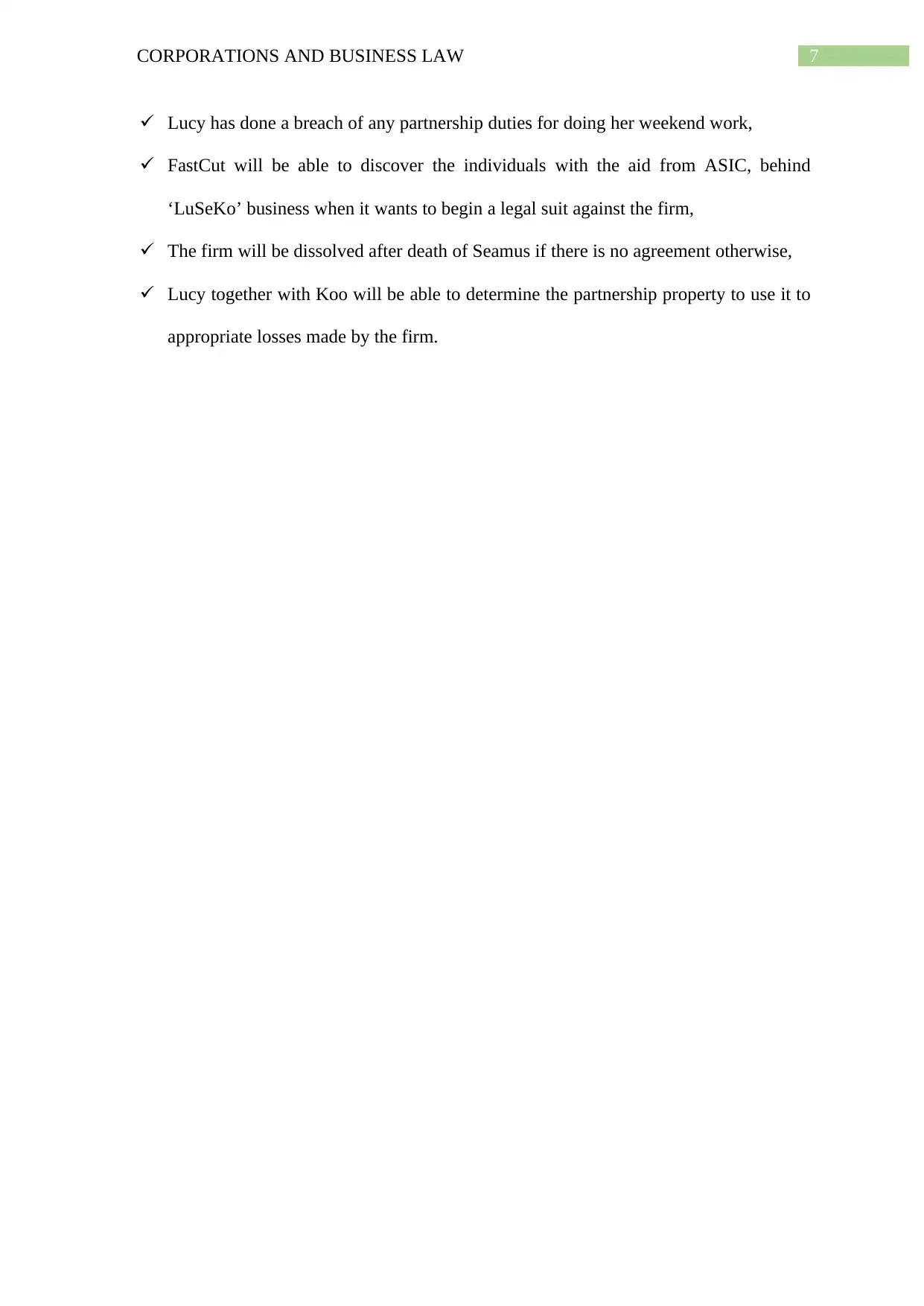
7CORPORATIONS AND BUSINESS LAW
Lucy has done a breach of any partnership duties for doing her weekend work,
FastCut will be able to discover the individuals with the aid from ASIC, behind
‘LuSeKo’ business when it wants to begin a legal suit against the firm,
The firm will be dissolved after death of Seamus if there is no agreement otherwise,
Lucy together with Koo will be able to determine the partnership property to use it to
appropriate losses made by the firm.
Lucy has done a breach of any partnership duties for doing her weekend work,
FastCut will be able to discover the individuals with the aid from ASIC, behind
‘LuSeKo’ business when it wants to begin a legal suit against the firm,
The firm will be dissolved after death of Seamus if there is no agreement otherwise,
Lucy together with Koo will be able to determine the partnership property to use it to
appropriate losses made by the firm.
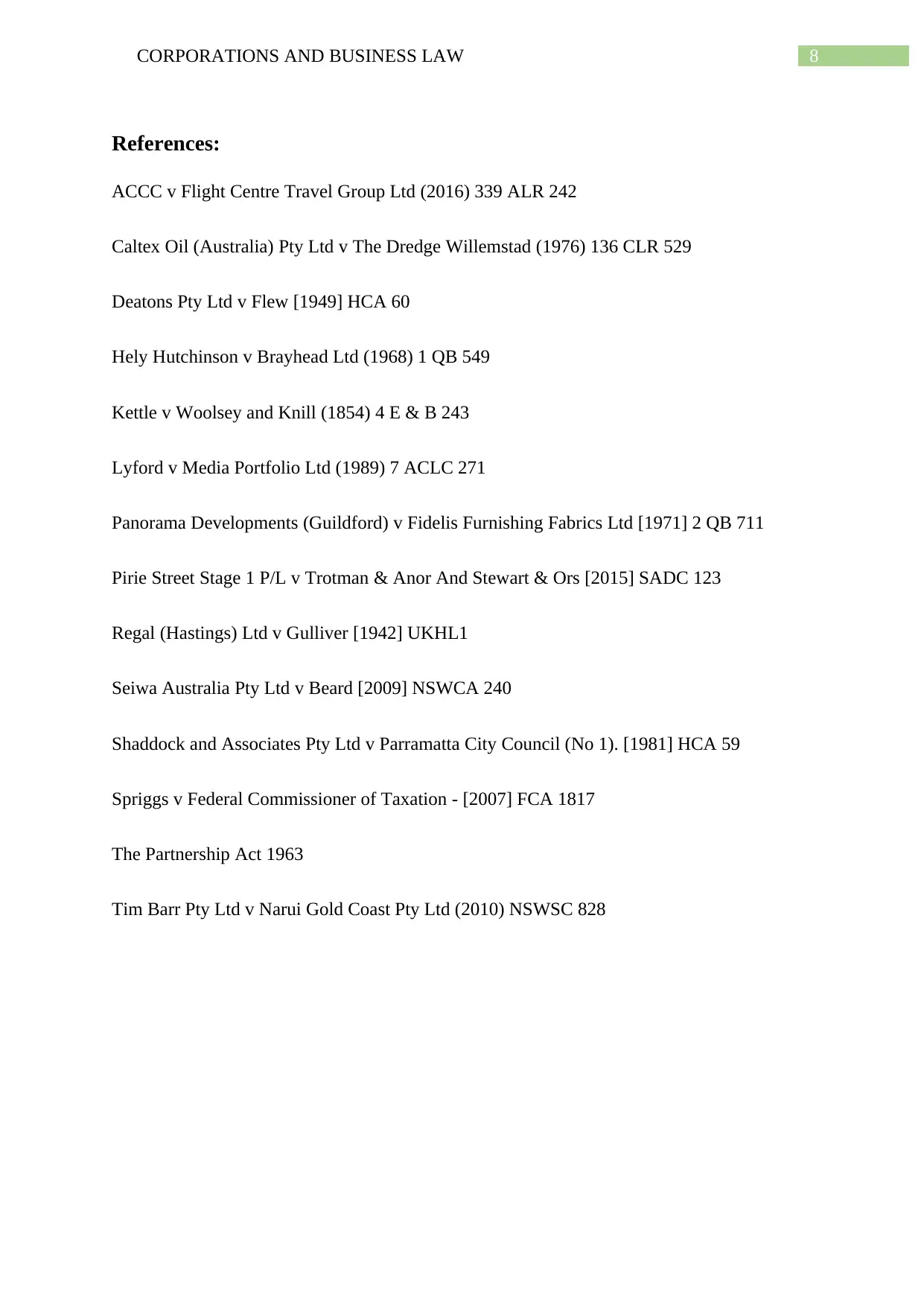
8CORPORATIONS AND BUSINESS LAW
References:
ACCC v Flight Centre Travel Group Ltd (2016) 339 ALR 242
Caltex Oil (Australia) Pty Ltd v The Dredge Willemstad (1976) 136 CLR 529
Deatons Pty Ltd v Flew [1949] HCA 60
Hely Hutchinson v Brayhead Ltd (1968) 1 QB 549
Kettle v Woolsey and Knill (1854) 4 E & B 243
Lyford v Media Portfolio Ltd (1989) 7 ACLC 271
Panorama Developments (Guildford) v Fidelis Furnishing Fabrics Ltd [1971] 2 QB 711
Pirie Street Stage 1 P/L v Trotman & Anor And Stewart & Ors [2015] SADC 123
Regal (Hastings) Ltd v Gulliver [1942] UKHL1
Seiwa Australia Pty Ltd v Beard [2009] NSWCA 240
Shaddock and Associates Pty Ltd v Parramatta City Council (No 1). [1981] HCA 59
Spriggs v Federal Commissioner of Taxation - [2007] FCA 1817
The Partnership Act 1963
Tim Barr Pty Ltd v Narui Gold Coast Pty Ltd (2010) NSWSC 828
References:
ACCC v Flight Centre Travel Group Ltd (2016) 339 ALR 242
Caltex Oil (Australia) Pty Ltd v The Dredge Willemstad (1976) 136 CLR 529
Deatons Pty Ltd v Flew [1949] HCA 60
Hely Hutchinson v Brayhead Ltd (1968) 1 QB 549
Kettle v Woolsey and Knill (1854) 4 E & B 243
Lyford v Media Portfolio Ltd (1989) 7 ACLC 271
Panorama Developments (Guildford) v Fidelis Furnishing Fabrics Ltd [1971] 2 QB 711
Pirie Street Stage 1 P/L v Trotman & Anor And Stewart & Ors [2015] SADC 123
Regal (Hastings) Ltd v Gulliver [1942] UKHL1
Seiwa Australia Pty Ltd v Beard [2009] NSWCA 240
Shaddock and Associates Pty Ltd v Parramatta City Council (No 1). [1981] HCA 59
Spriggs v Federal Commissioner of Taxation - [2007] FCA 1817
The Partnership Act 1963
Tim Barr Pty Ltd v Narui Gold Coast Pty Ltd (2010) NSWSC 828
⊘ This is a preview!⊘
Do you want full access?
Subscribe today to unlock all pages.

Trusted by 1+ million students worldwide
1 out of 9
Related Documents
Your All-in-One AI-Powered Toolkit for Academic Success.
+13062052269
info@desklib.com
Available 24*7 on WhatsApp / Email
![[object Object]](/_next/static/media/star-bottom.7253800d.svg)
Unlock your academic potential
Copyright © 2020–2026 A2Z Services. All Rights Reserved. Developed and managed by ZUCOL.





